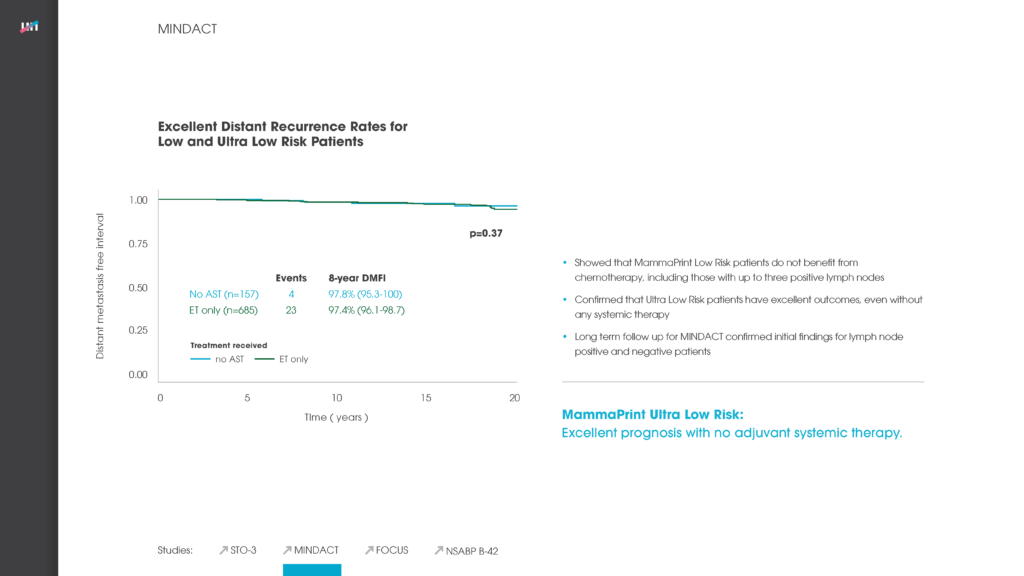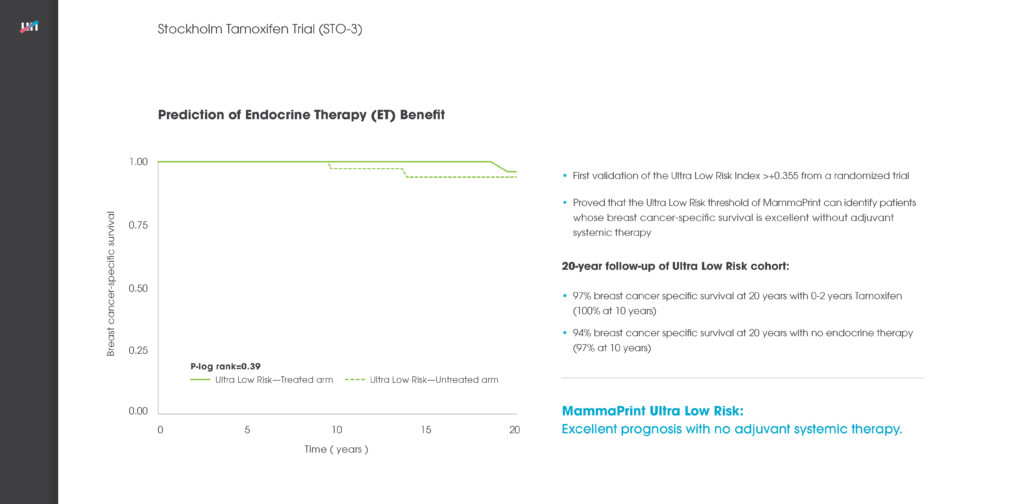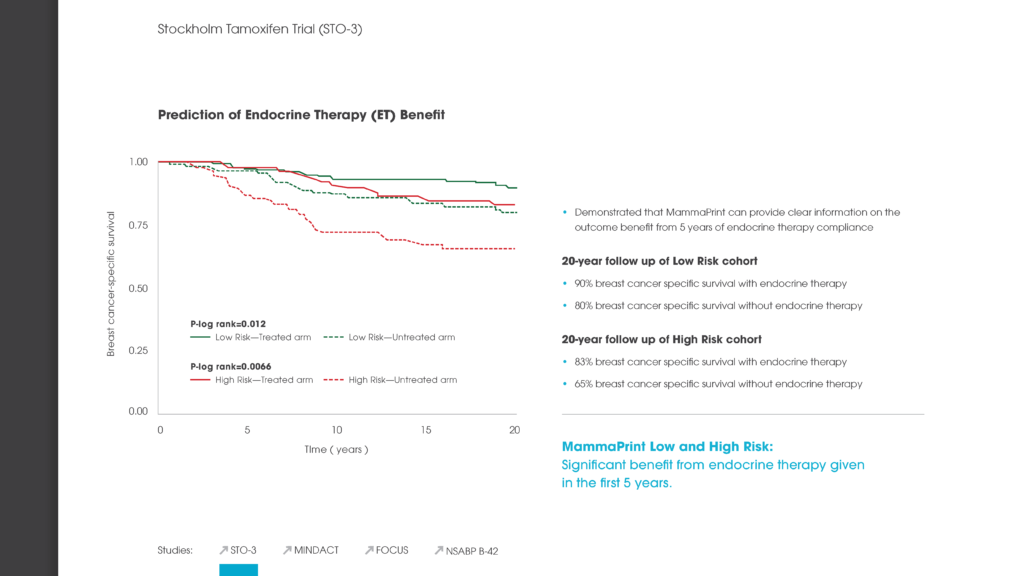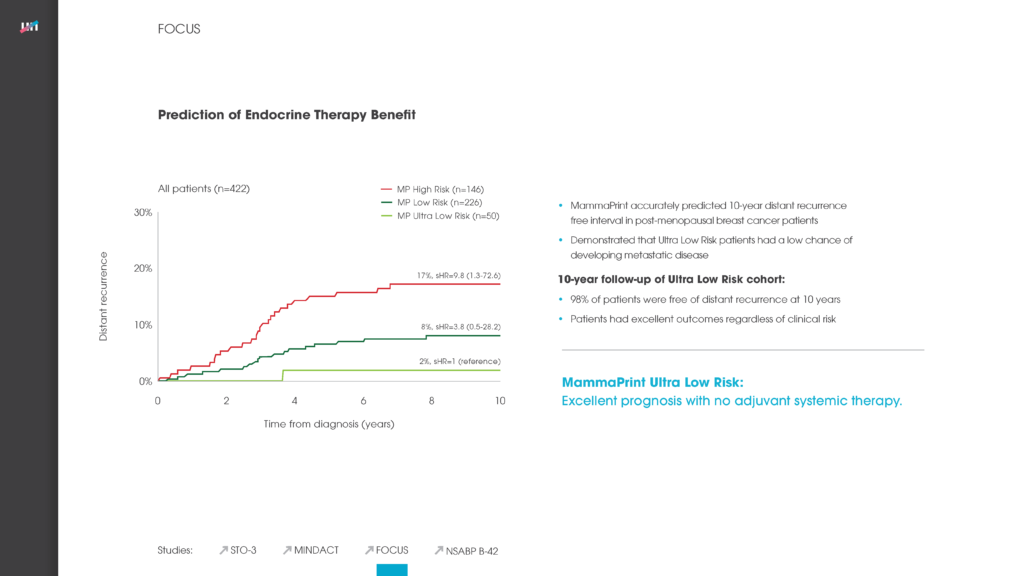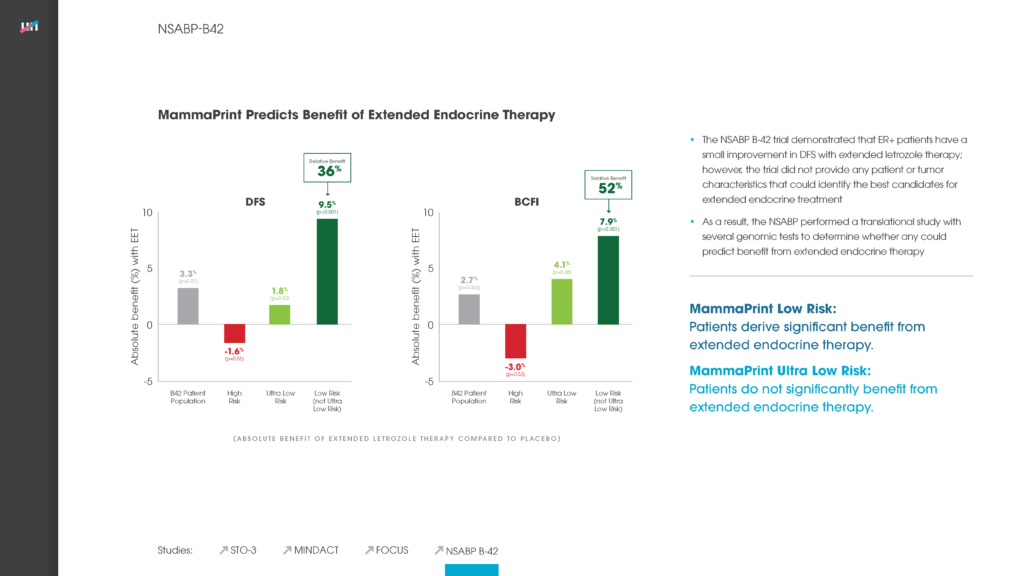IRVINE, CA and AMSTERDAM, THE NETHERLANDS, June 10, 2014 – There are substantial differences between the results provided by Agendia’s next-generation breast cancer tests and more limited results from the first-generation, 21-gene assay, according to findings presented at the recently concluded annual meeting of the American Society of Clinical Oncology (ASCO).
Researchers from the University of Pittsburgh School of Medicine reported the first independent study to directly compare clinical data from Agendia’s next-generation MammaPrint® and BluePrint® tests to data from the first-generation, 21-gene test. David J. Dabbs, M.D., Adam Brufsky, M.D. and colleagues at the University of Pittsburgh and related institutions presented the findings, which encompassed five-year outcome data from 437 patients.
When tested by the 21-gene assay, nearly 37% of patient samples were classified as “intermediate” clinical risk for the likelihood that the breast cancer would recur. This compared to a definitive high-risk or low-risk result for all patient samples tested using the MammaPrint assay.
“Together, MammaPrint and Blueprint reassign a substantial number of intermediate recurrence scores into ‘Low’ or ‘High’ risk
Dr. Brufsky added that this is “valuable information because it can help us better determine how best to treat each patient. With a high-risk, low-risk finding, you don’t have the uncertainty that occurs in the intermediate range.”
The 70-gene MammaPrint test provides the foundational risk classification of High Risk or Low Risk about breast cancer recurrence without the ambiguity of intermediate results. Additional significant, therapy-relevant information is then conferred by the 80-gene BluePrint assay that identifies the molecular subtype. Blueprint provides insight into the predominant genomic pathway driving the cancer, thereby facilitating prediction of tumor response to pathway-targeted therapies before and after surgery. These tests are the only widely available assays that provide “functional” molecular subtyping to guide breast cancer treatment decisions.
“By looking at the activity of the genes through molecular subtyping, the 80-gene test tells us more about what’s happening in the cancer cells,” Dr. Brufsky said.
In another study presented at ASCO, researchers from MedStar Washington Hospital Center reported African-American women are more likely to be diagnosed with higher-risk breast cancer.
Their study used MammaPrint and BluePrint to determine recurrence risk and molecular subtype in a group of 100 African-American women with breast cancer. Patients in that group often presented with disease that had a high risk of recurrence, regardless of the stage of the disease. More information on the study is available here.
The University of Pittsburgh and MedStar Washington studies were two of seven Agendia-related scientific posters presented at ASCO. Those findings and a podium presentation documented the latest research and clinical successes with Agendia’s genomic tests, which use molecular diagnostic analysis and personalized medicine to help clinicians improve treatment of breast cancer and colon cancer.
Among the other studies at ASCO, Peter Beitsch, M.D. of Medical City Dallas Hospital and colleagues reported data from the “NBRST” registry, in which 55 U.S. institutions utilizing TheraPrint were able to identify 15 gene expression markers that correlated with response to neoadjuvant (presurgical) chemotherapy as part of breast cancer treatment. Researchers concluded that the novel TheraPrint assay from Agendia can help predict a patient’s preoperative response to chemotherapy – thereby making a potentially valuable contribution to clinical decision-making.
Also at ASCO, a research team headed by Pat Whitworth, M.D. (Nashville Breast Center) reported that molecular subtyping using MammaPrint and BluePrint more accurately reclassified 23% of 336 tumors that were initially classified using traditional IHC-FISH pathology methods. The research is also part of the Neoadjuvant Breast Registry Symphony Trial (NBRST) trial.
Three other studies detailed aspects of Agendia’s molecular diagnostics technology as applied to colorectal cancer:
* Drawing on a large international study, Ramon Salazar, M.D., Ph.D., M.Sc., reported on the successful identification of molecular subtypes of colorectal cancer using Agendia technology. The scientific poster also concluded that a treatment strategy combining standard drugs to treat colorectal cancer, along with agents that suppress a specific cell-signaling pathway, may benefit patients who fit one of the subtypes identified in the research. Dr. Salazar is Head of Translational Research at the Catalan Institute of Oncology (Barcelona, Spain).
* A separate scientific poster from Dr. Salazar and others reported comparisons between Agendia’s ColoPrint colorectal cancer assay and risk stratification using criteria from the National Comprehensive Cancer Network. The data is part of the prospective, international PARSC study assessing recurrence risk in Stage II colorectal cancer patients using the 18-gene ColoPrint test.
* In a podium presentation, Rodrigo Dienstmann, M.D., Ph.D., of Sage Bionetworks (Seattle, Wash.) detailed open-source international research into molecular subtypes of colorectal cancer, to which Agendia is contributing data.
The ASCO 2014 annual meeting was held May 30 – June 3 at McCormick Place, in Chicago, Ill.
Resources for further reference
* RASTER prospective outcome study and press release.
* MammaPrint can accurately stratify breast cancer risk for up to 25 years after first diagnosis: study and press release.
* Molecular subtyping of breast cancer study.
About Agendia
Agendia is a leading molecular diagnostics company that develops and markets FFPE-based genomic diagnostic products, which help support physicians with their complex treatment decisions. Agendia’s tests were developed using an unbiased gene selection by analyzing the complete human genome. This includes MammaPrint as well as BluePrint, a molecular subtyping assay that provides deeper insight leading to more clinically actionable biology, TheraPrint, and TargetPrint, an ER/PR/HER2 expression assay. MammaPrint is the only breast cancer recurrence assay backed by peer-reviewed, prospective outcome data. These tests can help physicians assess a patient’s individual risk for metastasis, which patients may benefit from chemo, hormonal, or combination therapy, and which patients may not require these treatments and can instead be treated with other, less arduous and less costly methods.
In addition, Agendia has a pipeline of other genomic products in development. The company collaborates with pharmaceutical companies, leading cancer centers and academic groups to develop companion diagnostic tests in the area of oncology and is a critical partner in the ISPY-2 and the MINDACT trials. For more information, visit www.agendia.com.
Contact:
Liz Dowling (Medical & Consumer Media)
Dowling & Dennis Public Relations
Tel. 415-388-2794
Matt Clawson (Financial Media)
Pure Communications
Tel. 949-370-8500
— END —

